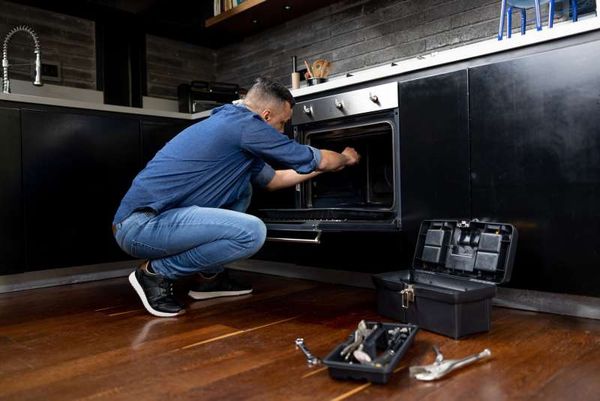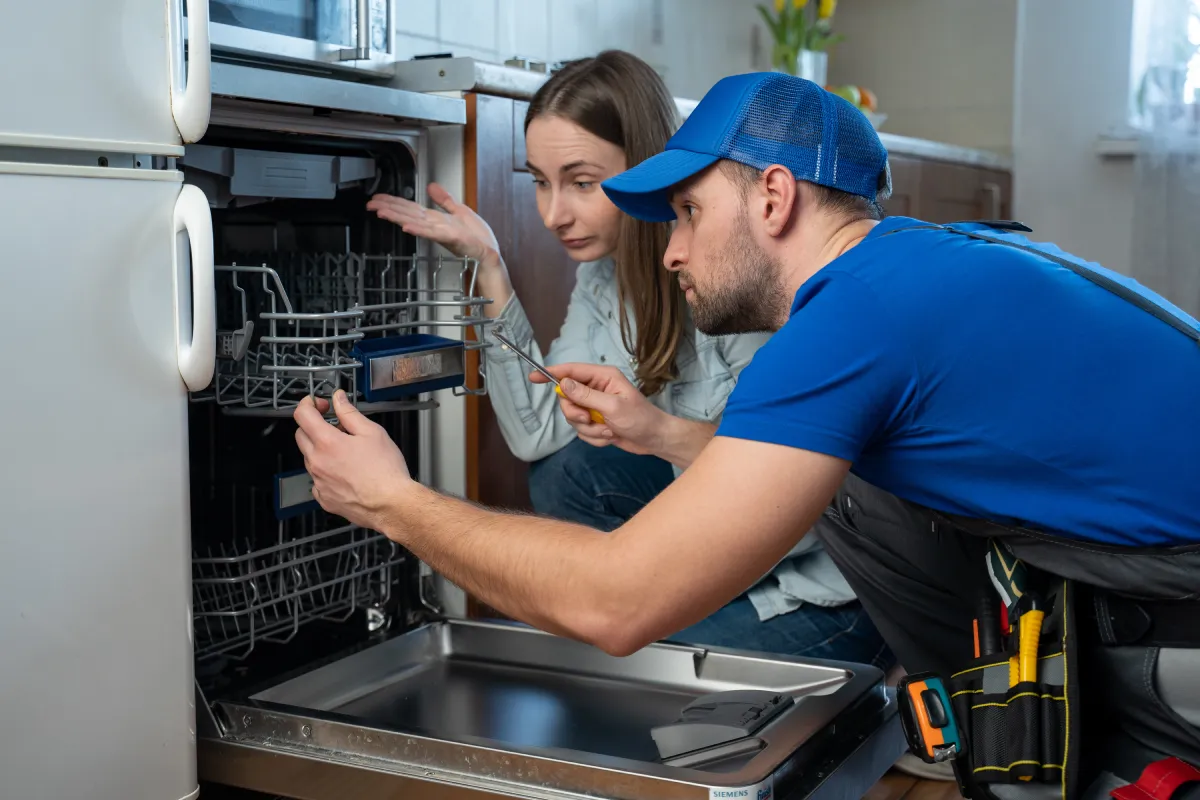The Ultimate Overview to Recognizing Appliance Fixing in the house
When your fridge stops cooling or your oven refuses to warm, it can feel frustrating. Understanding home appliance repair in the house can save you time and money. You'll find out to recognize symptoms, utilize vital tools, and adhere to an organized troubleshooting procedure. But prior to you start, there are critical security preventative measures you need to take into account. What are one of the most usual troubles, and how can you fix them? Let's check out the fundamentals.
Usual Device Troubles and Their Symptoms
When your appliances begin breaking down, it's necessary to acknowledge the indications beforehand. Disregarding them can result in larger issues and costly repairs. For instance, if your refrigerator isn't cooling correctly, you may observe warm areas or condensation developing. This can indicate a failing compressor or a blocked vent.Your dish washer may reveal troubles with unclean meals or unusual sounds throughout cycles. If you listen to grinding or clanking, it's time to investigate.A washing device that won't rotate or drain pipes can leave you with soggy laundry, recommending a clogged up drainpipe or a malfunctioning pump.Lastly, if your oven's temperature level seems off or it takes permanently to pre-heat, you may be handling a defective thermostat. By remaining alert to these symptoms, you can deal with concerns prior to they intensify into major repair work.
Necessary Devices for Home Appliance Fixing
When you're dealing with device repair services at home, having the right tools is essential. Fundamental hand tools like screwdrivers and pliers will certainly aid you disassemble and take care of different appliances, while electrical testing gadgets assure you're working securely with wiring. Let's look at what you need to obtain started on your repair journey.
Basic Hand Devices
Having the right tools is vital for reliable appliance repair service in the house. Begin with a dependable screwdriver collection, including both flathead and Phillips types, as screws are common in home appliance setting up. Pliers are also vital; they aid with gripping, twisting, and cutting cords or little components. A pair of needle-nose pliers can get to difficult situations easily. You'll require a good flexible wrench for tightening or loosening up nuts and screws. An utility blade comes in handy for puncturing product packaging or insulation. Finally, do not neglect a durable workbench or surface area to safely arrange your tools and parts. With these basic hand devices, you'll be well-prepared to tackle most appliance fixings that come your way.
Electric Screening Tools
Along with fundamental hand devices, electrical screening devices play a crucial role in appliance fixing. These devices help you diagnose electric issues and guarantee appliances operate securely. A multimeter is essential; it measures voltage, current, and resistance, permitting you to determine issues rapidly. A non-contact voltage tester is an additional essential, letting you find live wires without making direct call, enhancing your security. Clamp meters are excellent for gauging existing circulation in cables without separating them, conserving you time and effort. Additionally, circuit testers can promptly inspect if outlets are operating properly. By utilizing these devices, you'll streamline your troubleshooting procedure and boost your fixing skills, making home appliance upkeep a whole lot simpler.
Step-by-Step Overview to Diagnosing Appliance Issues
When your appliance breaks down, it can be irritating, but diagnosing the issue doesn't have to be frustrating. You'll discover to identify usual issues and apply efficient troubleshooting strategies. Let's stroll with the steps to get your device back in functioning order.
Typical Device Problems

Repairing Techniques Described

Fixing Major Kitchen Devices: A Closer Look
Have you ever questioned exactly how to take on typical problems with your cooking area devices? Fixing significant cooking area devices like refrigerators, stoves, and dishwashers can be easier than you assume. Start by recognizing the trouble-- whether it's a fridge not cooling or a stove that won't heat up. Frequently, a straightforward reset or checking the power source can solve the issue.For refrigerators, clean the condenser coils and check the door seals. If your stove's not home heating, examine the burner and thermostat. Dishwashing machines could simply need a tidy filter or a reset to obtain them back in action. Always disconnect the device before diving right into fixings to guarantee your safety.Don' t fail to remember to speak with the individual guidebook for details repairing tips associated with your version. With a little persistence and the right devices, you can confidently deal with appliance repairs and save money at the same time!

Repairing Washing Appliances: Tips and Techniques
When your washing devices start breaking down, it can feel frustrating, yet troubleshooting them does not have to be a trouble. Beginning by examining the power supply. Confirm the device is connected in and the outlet is working. Next, examine the door or lid button; a defective button can stop the equipment from operating.For washers, if it's not spinning, look for unbalanced tons. Redistributing the garments might address the issue. If your clothes dryer isn't home heating, tidy the lint filter and inspect the vent for blockages.Listen for uncommon sounds; they can indicate a trouble. If your home appliance is leaking, inspect the tubes for fractures or loose connections. Record any type of mistake codes shown on electronic displays, as they can lead you in determining the concern. Ultimately, seek advice from the user manual for particular fixing ideas associated to your model.
Security Precautions to Take During Repair works
Before you start any kind of appliance repair services, Dryer repair Oro Valley Dependable Refrigeration & Appliance Repair Service it's important to focus on safety and security to stop mishaps or injuries. First, disconnect the device or switch off the circuit breaker to guarantee no power reaches it while you function. Use protected devices to decrease the threat of electrical shock. Put on safety and security goggles and gloves to shield on your own from sharp sides or debris (Dependable Refrigeration & Appliance Repair Service Washer repair near me).Make specific your work area is tidy and well-lit, so you can see what you're doing. Keep kids and pets far from the area to stay clear of disturbances and potential dangers. If you're handling gas home appliances, be added cautious; look for leakages prior to proceeding.Take your time, and do not hurry with repair services. If you really feel unclear concerning any type of action, it's much better to pause and research study than to presume. Following these preventative measures will certainly help create a more secure environment for your DIY home appliance repair task
When to Call an Expert for Aid
Just how do you know if it's time to employ a specialist for home appliance repairs? If you have actually attempted standard troubleshooting without success, it's a clear indication. For instance, if your appliance still won't begin or shows uncommon sounds after resetting it, do not think twice to look for specialist help.When you notice leaks, smoke, or shedding scents, focus on safety and security and call a professional quickly. These concerns can bring about even more substantial damages or pose threats to your home.Also, if your device is under service warranty, speaking to a professional is often the most effective path. They can assure that repairs will not nullify your warranty, conserving you money in the lengthy run.Finally, if you're uncertain or uneasy with complex repairs, it's important to leave it to the specialists. Bear in mind, dealing with difficult concerns without the appropriate expertise can result in expensive errors. Depend on an expert when unsure!
Often Asked Concerns
Exactly How Can I Stop Home Appliance Issues in the Future?
To protect against device troubles in the future, you ought to perform normal upkeep, look for damage, clean filters, and prevent overloading. Staying positive will help prolong their lifespan and keep them running smoothly.
What Are one of the most Usual DIY Device Repair Service Mistakes?
You might overlook safety and security preventative measures, miss repairing actions, or use wrong tools when attempting do it yourself device fixings. Rushing the procedure or disregarding manufacturer guidelines can lead to even more considerable concerns and pricey mistakes. Stay individual and educated!
How Do I Know if a Part Needs Replacement?
You can inform if a component needs replacement by inspecting for uncommon sounds, leaks, or inconsistent efficiency. If the home appliance struggles to operate appropriately or reveals visible damages, it's most likely time for a substitute.
Can I Make Use Of Generic Parts for Home Appliance Repairs?
Yes, you can use generic components for home appliance repair work, yet identify they work - Maytag Washing machine repair Dependable Refrigeration & Appliance Repair Service. Generic parts might save you cash, yet they might affect performance or longevity, so consider your options very carefully prior to making a decision
What Service Warranties Cover Home Appliance Repair Works?
Most device guarantees cover repair work for manufacturing issues, but they typically omit damage from abuse. Check your warranty terms carefully, as some might call for utilizing qualified specialists and original parts for insurance coverage to continue to be legitimate.